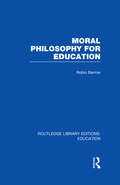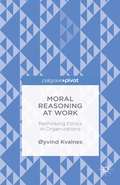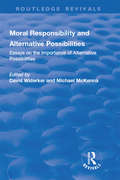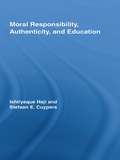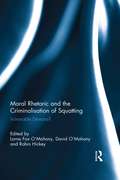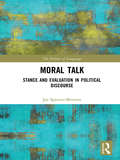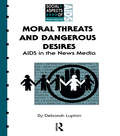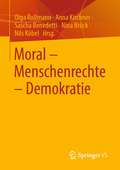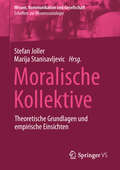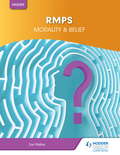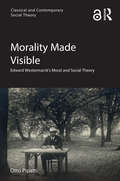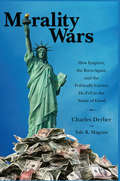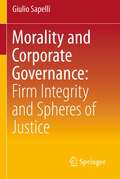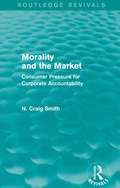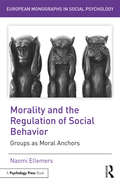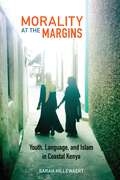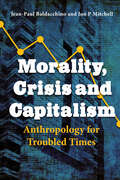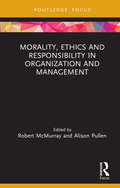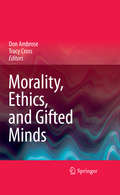- Table View
- List View
Moral Philosophy for Education (Routledge Library Editions: Education)
by Robin BarrowTeachers and students are frequently confused as to the relevance of abstract philosophical theorising to the reality of the classroom and this book is distinctive for the attention it devotes to philosophy and its potential contribution to practical matters, and education in particular. The author is critical of many current views of the philosophy of education and argues the validity of philosophy as an integral part of education in its own right, against the creation of a ‘new’ branch of philosophy, the ‘philosophy of education’. The book stresses that relativist ethical theories are no more ‘known’ to be valid than the absolutist theories they have replaced, and in the second section the author argues for a modified utilitarian position. The final section enables the reader to relate the general argument of the second part to several specific issues.
Moral Philosophy: Theories and Issues
by Emmett BarcalowThis core text in ethics devotes the first half to moral theory and the second half to contemporary moral issues. Designed for the beginning student with no background in philosophy, it is an understandable and engaging introduction to the range of theory and issues that are most pressing to today's students. First, an introductory chapter on moral reasoning provides a solid framework for evaluating and constructing moral arguments. Following that, one finds comprehensive coverage of all major ethical theories, including virtue ethics, natural law theory, divine command theory, and social contract theory. Finally, students get to see this theory in action amidst seven chapters devoted to important discussions in applied ethics.
Moral Politics: How Liberals and Conservatives Think (2nd edition)
by George LakoffIn this classic text, the first full-scale application of cognitive science to politics, George Lakoff analyzes the unconscious and rhetorical worldviews of liberals and conservatives, discovering radically different but remarkably consistent conceptions of morality on both the left and right. For this new edition, Lakoff adds a preface and an afterword extending his observations to major ideological conflicts since the book's original publication, from the impeachment of Bill Clinton to the 2000 presidential election and its aftermath.
Moral Reasoning at Work: Rethinking Ethics In Organizations
by Ø. KvalnesThis book is open access under CC-BY license. Moral dilemmas are a pervasive feature of working life. Moral Reasoning at Work offers a fresh perspective on how to live with them using ethics and moral psychology research. It argues that decision-makers must go beyond compliance and traditional approaches to ethics to prepare for moral dilemmas.
Moral Responsibility and Alternative Possibilities: Essays on the Importance of Alternative Possibilities
by David Widerker and Michael McKennaThis book was published in 2003. This book explores an important issue within the free will debate: the relation between free will and moral responsibility. In his seminal article "Alternate Possibilities and Moral Responsibility", Harry Frankfurt launched a vigorous attack on the standard conception of that relation, questioning the claim that a person is morally responsible for what she has done only if she could have done otherwise. Since then, Frankfurt's thesis has been at the center of philosophical discussions on free will and moral responsibility. "Moral Responsibility and Alternative Possibilities", edited by David Widerker and Michael McKenna, draws together the most recent work on Frankfurt's thesis by leading theorists in the area of free will and responsibility. As the majority of the essays appear here for the first time, "Moral Responsibility and Alternative Possibilities" offers the newest developments in this important debate.
Moral Responsibility, Authenticity, and Education (Routledge International Studies in the Philosophy of Education)
by Stefaan E. Cuypers Ishtiyaque HajiThe primary purpose of this book is to explain the distinction, on the one hand, between indoctrination and education, and, on the other, between responsibility-subverting manipulation and mere causation. Both are elucidated by an appeal to common ground, an account of when our motivations and other springs of action are "truly our own" or "authentic." The book progresses from analyses of the sort of agency that responsibility requires and the authenticity of our motivations, together with a discussion of the relevance of these analyses to manipulation and related problems in the philosophy of education, to a defense of the thesis that responsibility from love's standpoint is of vital significance, and the implications of this thesis for what the authors deem to be legitimate goals of education and other issues in free will. Philosophers and advanced students working in free will, moral psychology, and the philosophy of education will find this text to be extremely useful.
Moral Rhetoric and the Criminalisation of Squatting: Vulnerable Demons?
by Lorna Fox O'Mahony David O'Mahony Robin HickeyThis collection of critical essays considers the criminalisation of squatting from a range of different theoretical, policy and practice perspectives. While the practice of squatting has long been criminalised in some jurisdictions, the last few years have witnessed the emergence of a newly constituted political concern with unlawful occupation of land. With initiatives to address the ‘threat’ of squatting sweeping across Europe, the offence of squatting in a residential building was created in England in 2012. This development, which has attracted a large measure of media attention, has been widely regarded as a controversial policy departure, with many commentators, Parliamentarians, and professional organisations arguing that its support is premised on misunderstandings of the current law and a precarious evidence-base concerning the nature and prevalence of ‘squatting’. Moral Rhetoric and the Criminalisation of Squatting explores the significance of measures to criminalise squatting for squatters, owners and communities. The book also interrogates wider themes that draw on political philosophy, social policy, criminal justice and the nature of ownership, to consider how the assimilation of squatting to a contemporary punitive turn is shaping the political, social, legal and moral landscapes of property, housing and crime.
Moral Talk: Stance and Evaluation in Political Discourse (The Politics of Language)
by Joe Spencer-BennettThis book is about moral talk in contemporary British political discourse, drawing on speeches, debates and radio phone-ins. Using a critical sociolinguistic approach, Spencer-Bennett explores the language people use to communicate moral judgement and highlights the relations between the things that people say, the contexts in which they are said and the circulating ideologies about meaning and morality. This is key reading for students and scholars studying language, politics and critical discourse analysis, within linguistics and anthropology.
Moral Threats and Dangerous Desires: AIDS in the News Media (Social Aspects of AIDS)
by Deborah LuptonSince 1981, AIDS has had an enormous impact upon the popular imagination. Few other diseases this century have been greeted with quite the same fear, loathing, and prejudice against those who develop it. The mass media, and in particular, the news media, have played a vital part in "making sense" of AIDS. This volume takes an interdisciplinary perspective, combining cultural studies, history of medicine, and contemporary social theory to examine AIDS reporting. There have been three major themes dominating coverage: the "gay-plague" dominant in the early 1980s, panic-stricken visions of the end of the world as AIDS was said to pose a threat to everyone, in the late 1980s; and a growing routinising of coverage in the 1990s. This book lays bare the sub-textual ideologies giving meaning to AIDS news reports, including anxieties about pollution and contagion, deviance, bodily control, the moral meanings of risk, the valorisation of drugs and medical science. Drawing together the work of cultural and politicaltheorists, sociologists and historians who have written about medicine, disease and the body, as well as that of theorists in Europe and the USA who have focused their attention specificaiiy on AIDS, this book explores the wide theoretical debate about the importance of language in the social construction of illness and disease. This text offers insights into the sociocultural context in which attitudes towards people with HIV or AIDS and people's perceptions of risk from HIV infection are developed and the responses of governments to the AIDS epidemic are formulated.
Moral and Political Discourses in Philosophy of Education
by Prakash Iyer Indrani BhattacharjeeThis book focuses on moral and political education and critically engages with educational issues from a philosophical perspective. It engages with questions of moral education as well as questions about citizenship education, to address apprehensions on learning in a liberal democracy while parallelly invoking issues from within the curriculum, the school environment and teacher-student relationship. With contributions from renowned philosophers and educationists, this volume discusses themes like civic education and liberal democracy; toleration and freedom; Tagore’s conception of the moral and political self; key issues in moral education; cosmopolitanism, compassion, care ethics and moral purpose of schooling; to revisit and rethink some foundational questions related to education, curriculum and pedagogy. This volume will be essential reading for educationists and educators and will be important for scholars and researchers of philosophy of education, education, teacher education and school education.
Moral – Menschenrechte – Demokratie
by Nina Brück Sascha Benedetti Nils Köbel Olga Rollmann Anna KirchnerDer Band konzentriert und fokussiert die Leitbegriffe Moral, Menschenrechte und Demokratie. Wie diese miteinander verwobenen sind und was sie zu gesellschaftlich und erziehungswissenschaftlich relevanten Kernthemen macht, wird in den Beiträgen zu den Themen Moral, Menschenrechte und Menschenwürdeverletzungen, Demokratiebildung sowie Partizipation analysiert und diskutiert.Eben diese thematische Breite und interdisziplinäre Ausrichtung zeichnet das Arbeiten und Forschen des Erziehungswissenschaftlers Professor Dr. Stefan Weyers aus, dessen wissenschaftliches Werk mit dieser Publikation gewürdigt wird.
Moralische Kollektive: Theoretische Grundlagen und empirische Einsichten (Wissen, Kommunikation und Gesellschaft)
by Stefan Joller Marija StanisavljevicOb Terroranschläge, Flüchtlings- oder Finanzkrisen – die Herausforderungen der globalisierten Moderne legen jene Bereiche frei, die Durkheim als anomisch bezeichnete und deren Bearbeitung nach wie vor die zentrale Stellung moralischer Kommunikation verdeutlicht. Einiges spricht dafür, dass die fortschreitende funktionale Differenzierung die Moral nicht erodieren lässt, sondern durch die zunehmende kommunikative Vernetzung geradezu eine Remoralisierung der Gesellschaft befördert. Überall dort, wo Missstände zu Tage treten und nicht abzusehen ist, wie diese im modus operandi befriedigend gelöst werden könnten, gibt die Moral ein verheißungsvolles Instrument zur Hand, das in Gestalt moralischer Kollektive den Alltag zu durchdringen und die Gesellschaft zu formen vermag. Der Sammelband widmet sich in diesem Sinne einer sowohl theoretischen wie auch empirischen Analyse der Moral, die als genuin soziale Größe über moralische Kollektive Form annimmt.
Moralische Spiele auf YouTube: Die Darstellung ethischer Computerspiele im Let’s Play und ihre Diskussion in den Userkommentaren (Digitale Kultur und Kommunikation #10)
by Sebastian FischerModerne Computerspiele erschaffen komplexe Welten, in denen sich Spielende nicht selten gezwungen sehen, kontrovers zu handeln oder schwierige moralische Entscheidungen zu treffen. Aber Spiele werden heute nicht mehr nur aktiv rezipiert. Insbesondere auf YouTube schauen Millionen Menschen täglich Videos von ‚Let’s-Playern‘, die ihre eigenen Spielerlebnisse aufzeichnen und live kommentieren. Dabei erschließen die Videoproduzenten*innen das ethische Potential der gezeigten Spiele, indem sie deren Möglichkeitsräume erkunden und ihre subjektiven Empfindungen und Entscheidungsprozesse verbalisieren. Die Rezipient*innen greifen die Inhalte der Videos wiederum auf und diskutieren darüber in den Userkommentaren. Auf diese Weise vollzieht sich eine massenhafte Distribution und Diskussion von moralischen Ideen, die weit über den virtuellen Raum YouTubes hinaus wirkt. Sebastian Fischer beschreibt dieses Phänomen ‚moralischer Let’s-Plays‘, indem er die Darstellung einiger der populärsten ethischen Computerspiele der vergangenen Jahre analysiert. Die Arbeit liefert nicht nur eine erste Deskription dieses bislang unerforschten Themas, sondern leitet auch Schlussfolgerungen ab, die sich auf den allgemeinen Prozess moralischen Spielens übertragen lassen.
Morality & Belief for Higher RMPS
by Joe WalkerThe only resource for RMPS at CFE Higher level, by a bestselling author and expert in the field.Joe Walker's new full colour book provides comprehensive coverage of the newly designed CFE Higher in Religious, Moral and Philosophical Studies, but is also ideal for students across Scotland studying key topic areas in Morality and Belief as part of the broad general education and the senior phase of RME. The book:Offers lively, accessible and engaging style with appropriate humour that reflects real-life situations and moral issuesHighlights the importance of dealing with varieties of belief within religious traditionsDeals with up-to-date contemporary and topical issues in a highly practical manner
Morality Made Visible: Edward Westermarck’s Moral and Social Theory (Classical and Contemporary Social Theory)
by Otto PipattiWhile highly respected among evolutionary scholars, the sociologist, anthropologist and philosopher Edward Westermarck is now largely forgotten in the social sciences. This book is the first full study of his moral and social theory, focusing on the key elements of his theory of moral emotions as presented in The Origin and Development of the Moral Ideas and summarised in Ethical Relativity. Examining Westermarck’s evolutionary approach to the human mind, the author introduces important new themes to scholarship on Westermarck, including the pivotal role of emotions in human reciprocity, the evolutionary origins of human society, social solidarity, the emergence and maintenance of moral norms and moral responsibility. With attention to Westermarck’s debt to David Hume and Adam Smith, whose views on human nature, moral sentiments and sympathy Westermarck combined with Darwinian evolutionary thinking, Morality Made Visible highlights the importance of the theory of sympathy that lies at the heart of Westermarck’s work, which proves to be crucial to his understanding of morality and human social life. A rigorous examination of Westermarck’s moral and social theory in its intellectual context, this volume connects Westermarck’s work on morality to classical sociology, to the history of evolutionism in the social and behavioural sciences, and to the sociological study of morality and emotions, showing him to be the forerunner of modern evolutionary psychology and anthropology. In revealing the lasting value of his work in understanding and explaining a wide range of moral phenomena, it will appeal to scholars of sociology, anthropology and psychology with interests in social theory, morality and intellectual history.
Morality Wars: How Empires, the Born Again, and the Politically Correct Do Evil in the Name of Good
by Charles Derber Yale R. MagrassIs patriotism a good thing in an empire? Did General Petraeus betray us or did Moveon? Does morality often serve immoral purposes? Morality Wars shows us how to understand the subtext of these questions and of all the debates about moral values and liberal versus conservative ideology. Derber and Magrass show that the moral problem today is not just lying but "immoral morality," doing evil in the name of good (e.g., Bush preemptively invading Iraq to spread liberty). The authors explore three ancient codes of immoral morality frighteningly resurrected in America today -those of empire, the politically correct, and the born again. Although the right today has recrafted historic arguments that empires bring peace, and fundamentalists battle moral decay, the authors show the Democratic Party and the left have their own IM, with Democrats supporting empire and the left its own political correctness. America's political divide today is a backlash to the progressive revolution of the 1960s and 1970s-secular, antiwar, and feminist-that created a radical break from traditional values and set the stage for current morality wars. In the spirit of de Tocqueville, this powerful book offers a rich and vivid portrait of America's political landscape, exploring ideas that can help move the nation to a new morality and politics.
Morality and Corporate Governance: Firm Integrity and Spheres of Justice
by Giulio SapelliFirms, the most significant nucleus of modern economic activity, are very special social organisations with economic purposes and also a responsibility for pursuing the welfare of all ranks of society. This requires moral commitment at a subjective and collective level, i.e. ethics. In this book, a renowned author with long experience as a consultant to large firms explores the relationship between moral action and economic action with particular reference to the firm. Diverse aspects of corporate responsibility - social, civil, political, and environmental - within a rapidly changing world are investigated from a philosophical perspective. Prerequisites for self-regulation are considered and aspects of responsibility beyond the law, such as charters of values and codes of ethics, are discussed. Particular attention is paid to firm integrity and different spheres of justice, each of which has its own criteria for the distribution of goods.
Morality and Health
by Allan M. Brandt Paul RozinFrom the castigation and stigmatization of victims of AIDS to our celebration of diet, exercise and fitness, the moral categorization of health and disease reflects contemporary notions that disease results from moral failure and that health is the representation of moral triumph. Ranging across academic disciplines and historical time periods, the essays in Morality and Health offer a compelling assessment of the powerful role of moral systems for judging the complex questions of risk and responsibility for disease, the experience of illness, and social and cultural responses to those who are sick. Contributors include Keith Thomas, Charles Rosenberg, Richard Shweder, Arthur Kleinman, David Mechanic, Nancy Tomes and Linda Gordon.
Morality and Masculinity in the Carolingian Empire
by Rachel StoneWhat did it mean to be a Frankish nobleman in an age of reform? How could Carolingian lay nobles maintain their masculinity and their social position, while adhering to new and stricter moral demands by reformers concerning behaviour in war, sexual conduct and the correct use of power? This book explores the complex interaction between Christian moral ideals and social realities, and between religious reformers and the lay political elite they addressed. It uses the numerous texts addressed to a lay audience (including lay mirrors, secular poetry, political polemic, historical writings and legislation) to examine how Biblical and patristic moral ideas were reshaped to become compatible with the realities of noble life in the Carolingian empire. This innovative analysis of Carolingian moral norms demonstrates how gender interacted with political and religious thought to create a distinctive Frankish elite culture, presenting a new picture of early medieval masculinity.
Morality and the Market: Consumer Pressure for Corporate Accountability (Routledge Revivals)
by N. Craig SmithCan businesses abandon the axiom that the customer is always right when consumers start questioning the ethics of business practices? Professor Craig Smith examines the theory and practice of ethical purchase behaviour, a crucial mechanism for ensuring social responsibility in business. He explains how and why consumers have used their purchasing power to influence corporate policies and practices. He argues the case for the social control of business, drawing on perspectives from marketing, economics, politics, sociology, and business policy. He concludes that the market may act as an arbiter of ‘good’ and ‘bad’ business practice. Dr Smith considers the practical aspects of ethical purchase behaviour, focusing on consumer boycotts as a specific form of this consumer behaviour, and explains how boycotted businesses should respond. This title, first published in 1990, is ideal for both business students and those who have a business of their own.
Morality and the Regulation of Social Behavior: Groups as Moral Anchors (European Monographs in Social Psychology)
by Naomi EllemersMorality indicates what is the ‘right’ and what is the ‘wrong’ way to behave. It is one of the most popular areas of research in contemporary social psychology, driven in part by recent political-economic crises and the behavioral patterns they exposed. In the past, work on morality tended to highlight individual concerns and moral principles, but more recently researchers have started to address the group context of moral behavior. In Morality and the Regulation of Social Behavior: Groups as Moral Anchors, Naomi Ellemers builds on her extensive research experience to draw together a wide range of insights and findings on morality. She offers an essential integrative summary of the social functions of moral phenomena, examines how social groups contribute to moral values, and explains how groups act as ‘moral anchors’. Her analysis suggests that intragroup dynamics and the desire to establish a distinct group identity are highly relevant to understanding the implications of morality for the regulation of individual behavior. Yet, this group-level context has not been systematically taken into account in research on morality, nor is it used as a matter of course to inform attempts to influence moral behavior. Building on social identity and self-categorization principles, this unique book explicitly considers social groups as an important source of moral values, and examines how this impacts on individual decision making as well as collective behaviors and relations between groups in society. Throughout the book, Ellemers presents results from her own research to elucidate how social behavior is affected by moral concerns. In doing this, she highlights how such insights advance our understanding of moral behavior and moral judgments for of people who live together in communities and work together in organizations. Morality and the Regulation of Social Behavior is essential reading for academics and students in social psychology and related disciplines, and is an invaluable resource for practitioners interested in understanding moral behavior.
Morality at the Margins: Youth, Language, and Islam in Coastal Kenya
by Sarah HillewaertThis book considers the day-to-day lives of young Muslims on Kenya’s island of Lamu, who live simultaneously on the edge and in the center. At the margins of the national and international economy and of Western notions of modernity, Lamu’s inhabitants nevertheless find themselves the focus of campaigns against Islamic radicalization and of Western touristic imaginations of the untouched and secluded. What does it mean to be young, modern, and Muslim here? How are these denominators imagined and enacted in daily encounters? Documenting the everyday lives of Lamu youth, this ethnography explores how young people negotiate cultural, religious, political, and economic expectations through nuanced deployments of language, dress, and bodily comportment. Hillewaert shows how seemingly mundane practices—how young people greet others, how they walk, dress, and talk—can become tactics in the negotiation of moral personhood.Morality at the Margins traces the shifting meanings and potential ambiguities of such everyday signs—and the dangers of their misconstrual. By examining the uncertainties that underwrite projects of self-fashioning, the book highlights how shifting and scalable discourses of tradition, modernity, secularization, nationalism, and religious piety inform changing notions of moral subjectivity. In elaborating everyday practices of Islamic pluralism, the book shows the ways in which Muslim societies critically engage with change while sustaining a sense of integrity and morality.
Morality, Crisis and Capitalism: Anthropology for Troubled Times
by Jon P. Mitchell Jean-Paul Baldacchino'May you live in interesting times’ was made famous by Sir Austen Chamberlain. The premise is that ‘interesting times’ are times of upheaval, conflict and insecurity - troubled times. With the growing numbers of displaced populations and the rise in the politics of fear and hate, we are facing challenges to our very ‘species-being’. Papers in the volume include ethnographic studies on the ‘refugee crisis’, the ‘financial crisis’ and the ‘rule of law crisis' in the Mediterranean as well as the crisis of violence and hunger in South America.
Morality, Ethics and Responsibility in Organization and Management (Routledge Focus on Women Writers in Organization Studies)
by Alison Pullen Robert McMurrayIn the aftermath of the financial crisis, and regular corporate scandals, there has been a growing concern with the moral and ethical foundations of business. Often these concerns are limited to narrow accounts of governance codes, regulatory procedures or behaviour incentives, which are often characterized by neoliberal bias underpinned by western masculine logics. This book challenges these limited accounts of ethics and responsibility. It looks at the writing of Gayatri C. Spivak who takes globally networked markets, people and ideas and provides tools to rethink subjectivity, ethics and corporate governance. Eschewing strict hierarchical notions of authority and identity, Spivak’s work invites us to consider who speaks for whom and for what in organizational contexts. Relationality is also to be found in the radical politics and feminist ethics of Judith Butler who continues to draw on and develop her account of performativity to interpret contemporary organizations, management and work. While popular accounts of corporate ethics often concern themselves with the aims and actions of those at the top of organizations, Lauren Berlant focuses on the struggles of those at the bottom of the new social structures created by contemporary forms of capital. Finally, the book also considers ecological challenges through the work of Val Plumwood, who spent a lifetime considering the threats and responsibilities we face in environmental terms, and developed a feminist ecological philosophy for understanding social and species differences. This book will be relevant to students and researchers across business and management, organizational studies, critical management studies, gender studies and sociology.
Morality, Ethics, and Gifted Minds
by Don Ambrose Tracy CrossMorality, Ethics and Gifted Minds explores much of the current wisdom on ethics and morality while developing new perspectives on the ethical dimensions of high ability. Prominent authors from diverse disciplines are brought together, recognizing that no single discipline can capture the essence and entirety of nettlesome, complex, multidimensional moral issues. More specifically, the book explores new dimensions of ethics and morality; magnifies the importance of applying highly intelligent minds to ethical issues while developing ways to strengthen the ethical awareness of the creative and gifted, and brings diverse, interdisciplinary perspectives to bear on these issues.
